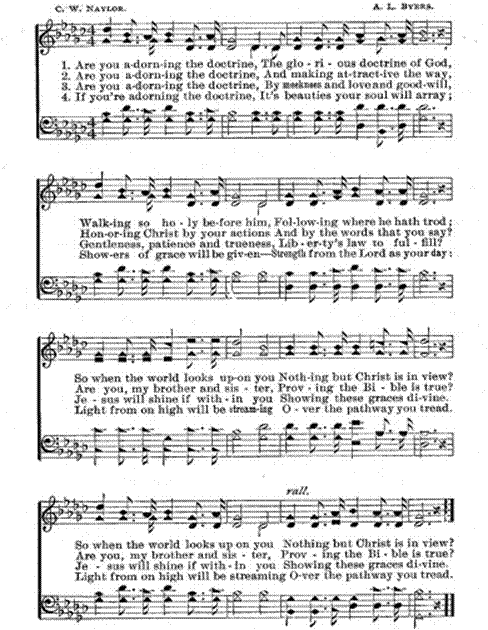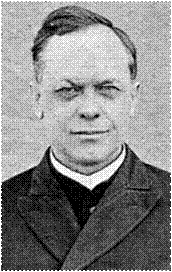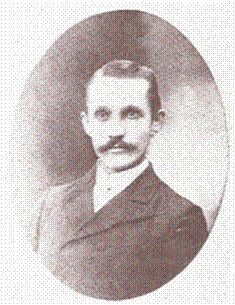|
“ARE YOU ADORNING THE DOCTRINE?” |
|
By
Rev. William P. Means
Pastor, Evangelist |
|
Are You Adorning the Doctrine?
Charles W. Naylor Andrew L. Byers
This singable hymn is a collaboration by Charles W. Naylor, who wrote the words, and Andrew L. Byers, who wrote the music.
Naylor was born in Ohio in 1874 and converted in the Methodist Church in 1892 while he was living with his grandparents because his mother had passed away when he was only 8 years old. The year he was converted, he attended an evangelistic meeting held by Barney Warren and S.L. Speck. They came back and held another meeting a year later and Naylor “saw” the church of God and became part of this Movement. In 1896 he joined the Gospel Trumpet Company while it was still in Grand Junction, MI. He left there to hold his first pastorate, which was in Columbus, Ohio.
During an evangelistic tour of the southern states in 1908, while helping to remove some timbers under the tent at a meeting in Sidney, Florida, he was seriously injured, dislocating one of his kidneys. Not too long after his incident, he was injured in a bus accident and became an invalid from June 1909 until his death in February of 1950. But, even though he was bedridden, because of the literary background in his family, he was able to write many songs and volumes of prose. He wrote for the Gospel Trumpet, eight books (the best known being The Secret of the Singing Heart), many tracts and 150 gospel songs.
The composer of the music for this hymn was Andrew L. Byers, who was born in 1869 into a musical Christian family. He began trying to compose music after a group of church of God singers visited the Byers family home in Illinois in April of 1888. He was heavily influenced by Barney Warren, who was a youth like he was, yet was preparing to publish a book of his own compositions called Anthems from the Throne.
Byers taught in Iowa for a while, but in June of 1891 came to work with the Gospel Trumpet Company, where he met his future wife, Della. He met Naylor there when Naylor came to work for the company in 1896, and the two collaborated on several songs. Byers was a charter member of the Board of Directors of the Gospel Trumpet Company, and served as vice president for 33 years, 20 of those also serving as Managing Editor. He helped publish 11 hymnals and song books. His most famous book is about the life of D.S. Warner, and is called Birth of a Reformation. In 38 years he composed over 250 tunes.
In 1922 the Byers family left the Gospel Trumpet Company and moved to California, where they helped develop several congregations of the church of God. He died in November of 1952, after a lingering illness, at the age of 82.
Dale Oldham said, “It was [the] inspired music which had so much to do with bringing to birth a new spirit of reformation among the people.” “It was inspired music, coupled to inspired preaching and witnessing, which led people to Christ and guided them into the ways of truth and righteousness.”
In this particular hymn (“Are You Adorning the Doctrine?”), the poet poses an interesting question. Are we really demonstrating the doctrines of the Bible in our lives for all to see and is our demonstration of those doctrines worthy of emulation? Paul tells us, “Ye are our epistle written in our hearts, known and read of all men” (2 Corinthians 3:2). Naylor points out that we are the only Bible that some folks will ever read or see and, as such, we had better be “adorning the doctrine.” Just what doctrines does this hymn point out?
Verse 1: Are you adorning the doctrine, The glorious doctrine of God, Walking so holy before Him, Following where He has trod. So when the world looks upon you Nothing but Christ is in view? So when the world looks upon you Nothing but Christ is in view.
The doctrine emphasized is that of holiness. Are we walking holy before our Lord? The writer of Hebrews informs us, “Follow peace with all men and holiness, without which no man shall see the Lord” (Hebrews 12:14). If we don’t live holy lives, people will see no reality to our religion. If we are to have credibility, then our Christian experience must make us look and act differently than the world acts and looks.
The only way to maintain holiness is to follow Christ all of our lives—as the hymn says, “following where He has trod.” Jesus said, “If any man serve me, let him follow me; and where I am, there shall also my servant be: if any man serve me, him will my Father honor,” John 12:26. You’ll never go wrong following Jesus! And why follow Him? So when the world looks upon us they will be able to see Jesus. Do people see Jesus in you?
Verse 2: Are you adorning the doctrine And making attractive the way, Honoring Christ by your actions And by the words that you say? Are you, my brother and sister, Proving the Bible is true? Are you, my brother and sister, Proving the Bible is true?
Verse 2 suggests that we as Christians can make Christianity attractive. How? By honoring Christ with our words and actions. 1 Peter 1:15 tells us, “Be ye holy in all manner of conversation.” A quick check of the Greek indicates that the world “conversation” means “lifestyle.” So Peter is suggesting that Christians ought to be holy in their lifestyle, in everything they do. That is how one honors Christ in words and actions, by a life of Spirit-filled holiness which spills over into the lives of others.
We all know people in churches who radiate goodness. We like to be around these people. The Bible tells us we ought to be that kind of people, and when we are, we’ll make Christianity attractive to those who are still unconverted.
Verse 3: Are you adorning the doctrine By meekness and love and goodwill, Gentleness, patience and trueness, Liberty’s law to fulfill? Jesus will shine if within you, Showing these graces divine. Jesus will shine if within you, Showing these graces divine.
The Apostle Paul says, “The fruit of the Spirit is love, joy, peace, longsuffering, gentleness, goodness, faith, meekness, temperance: against such there is no law,” Galatians 5:22-23. The writer of our hymn embodies the fruit of the Spirit into this third verse. In this hymn of holiness he is telling us that, if we are filled with the Spirit of God by sanctification, that wonderful second work of grace, we will show forth the fruit of the Spirit in our lies. The true evidence of Spirit-filling in one’s life is not any spiritual gift; it is the fruit of the Spirit manifested in our lives for all to see.
And one filled with the Spirit “shines.” There is an inner glow about a holy person. Remember, we are made holy when we are saved. We are no longer sinners then, but “called to be saints,” Romans 1:7. Then our holiness is maintained by sanctification, followed by a daily walk and daily submission to His Lordship in our lives.
The church of yesteryear called the fruit of the Spirit, Christian graces. I like that. How important it is, if we are going to win more souls to Christ, that we show that these divine graces in our lives are worthy of emulation. Paul was able to say, “Be ye followers of me, even as I also am of Christ,” 1 Corinthians 11:1. We ought to be able to say the same thing. Can you? Can people see the fruit of the Spirit in your words and actions?
Verse 4: If you’re adorning the doctrine It’s beauties your soul will array; Showers of grace will be given, Strength from the Lord as your day. Light from on high will be streaming Over the pathway you tread, Light from on high will be streaming Over the pathway you tread.
Verse 4 extols the benefits of holiness. It basically says that, if we are holy, (1) we’ll have beauty of life around us (“Worship the Lord in the beauty of holiness,” Psalm 29:2); (2) God’s grace [will be] upon us (“There shall be showers of blessing,” Ezekiel 34:26); (3) God’s strength [will be] within us (“In the Lord I have righteousness and strength,” Isaiah 45:24); and (4) God’s direction [will go] ahead of us (“A lamp unto my feet, and a light unto my path,” Psalm 119:105). What more could a Christian want?
This article originally appeared in the book compiled by Pastors’ Fellowship called The Theology behind Church of God Hymns, published in 1998.
A Wrong Idea of the Sanctified Life By Charles Wesley Naylor
Another error [in thinking of living holy] is that, to maintain such a life, we must hold ourselves aloof from others, or that it makes one feel that he will be contaminated by contact with others. Sanctification does not make us Pharisees. It does not take us out of the natural relations of life. It only fits us more perfectly for them. Jesus was our perfect example in this respect, and He took part in all the affairs of life and mingled with all sorts and classes of people, yet He kept Himself unspotted from the world. He was “separate from sinners” [Hebrews 7:26] even when He mingled with them and was most closely associated with them. He partook of none of their sins; He kept Himself aloof from all that was bad in their lives; but in other things He partook with them. So may we. We may fill our part in the social world and in all the relations of life in a way becoming to Christians and in a way that is pure and holy. To feel that we are better than others and to hold ourselves aloof from them will not attract them to our religion; on the contrary, it will make them despise us. It is only pride that leads to such an isolation. We must not partake of the sins of sinners, and that sometimes will keep us out of their company; but we should not carry the separation farther than is proper. We should be sociable and neighborly at all times.
From Winning a Crown, p. 122 Anderson, IN: Gospel Trumpet Co., 1919
|



